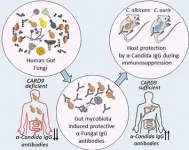Researchers found that more than two-thirds of people (71%) could accept a vaccine depending on its characteristics, with their decision based largely on its effectiveness and country of origin.
Based on their findings, the authors recommend that mass vaccination strategies in France would be most successful if they use vaccines with robust evidence of high levels of effectiveness, especially vaccines produced in the USA or the European Union, and emphasise the collective benefits of herd immunity.
While the study was conducted in France - where vaccine skepticism, in general, is high -highlights potential hurdles that widespread distrust of new vaccines could pose to a vaccine rollout strategy to achieve herd immunity. The authors also note that the study was undertaken before the development of highly effective vaccines, which may have altered people's attitudes.
To date, three COVID-19 vaccines have been approved for use in the European Union. Reaching herd immunity - when upwards of 60% of a country's population is immune due to infection or vaccination - will likely involve the need for mass vaccination, as physical distancing measures aim to prevent people from becoming infected. However, recent evidence from opinion polls suggests that COVID-19 vaccine hesitancy is increasing worldwide. [1]
The authors of the new study surveyed a representative sample of 1,942 adults in France aged 18-64 years using a two-part online questionnaire. The first section sought background information such as participants' past vaccination behaviour and their risk of having a severe case of COVID-19.
In the second part, participants selected from a range of options relating to scenarios involving several hypothetical vaccines. These differed on four characteristics: efficacy (50%, 80%, 90%, or 100%); risk of serious side effects (1/10,000 or 1/100,000 vaccinated people); country of manufacturer (European Union, USA, or China); and site of vaccination (GP practice, local pharmacy, or mass vaccination centre).
Analysing survey responses using a behavioural model enabled researchers to distinguish between people who would accept a vaccination with certain characteristics (known as vaccine hesitancy) and those who would always refuse one - a distinction that is usually not explored using opinion poll data.
Dr Verity Watson, of the University of Aberdeen, UK, said: "We used a study design that allowed us to separate people into two groups: those who will accept vaccination depending on its characteristics, and those who would always refuse one. This information is important for designing mass vaccination campaigns because it shows how sensitive uptake is to the design of the campaign. Opinion polls are rarely able to separate people in this way."
The authors found that nearly one third (29%, 650/1,942) of the French working-age population would refuse any COVID-19 vaccine. Among participants who would not outright refuse a vaccine (71%, 1,382/1,942), hesitancy mainly depended upon the effectiveness of vaccines and the country where they were made.
Vaccine hesitancy was minimised - resulting in a 61% acceptance rate overall - in a scenario using a vaccine manufactured in the European Union that was 90% effective and had a low risk of serious side effects (1/100,000 people vaccinated). Vaccine hesitancy was at its highest - an acceptance rate of only 27% overall - in a scenario involving a Chinese-made vaccine with 50% effectiveness and a risk of serious side effects of 1/10,000.
Survey responses also indicated that a reduction in hesitancy for a vaccine with 90% efficacy (compared with a vaccine with 50% efficacy) was entirely offset if it was made in China rather than the European Union. The authors suggest that hesitancy based on country of origin may be due to perceived rushed development and safety concerns about vaccines made in countries outside the European Union.
The collective benefits of herd immunity should be emphasised as part of mass vaccination strategies, the authors suggest, as communicating these was associated with significantly less COVID-19 vaccine hesitancy.
Both hesitancy and outright refusal to be vaccinated were more likely among women, people with lower educational achievements, and those who had previously chosen not to receive other recommended vaccinations. People aged 18-24 years and 55-64 years were less likely to outright refuse or be hesitant about accepting a vaccine than people aged 25-54 years.
Dr Michaël Schwarzinger, of Bordeaux University Hospital, France, said: "Understanding the factors that determine whether or not working-age people will accept a COVID-19 vaccine is vital. Like France, the majority of the population in most high-income countries is made up of working-age people, which means that reaching herd immunity through a mass vaccination campaign can only be achieved if they are willing to take part."
"Our findings suggest that vaccine hesitancy, alongside other factors including limited vaccine supplies and the emergence of new COVID-19 strains, continues to pose major challenges to getting the pandemic under control. With evidence indicating that hesitancy to receive a COVID-19 vaccine is growing worldwide, studies such as ours are important for helping to inform the development and rollout of national vaccination strategies that people are likely to support." [2]
The authors acknowledge that the main limitation of the study is the timing of the survey. In July 2020, stringent physical-distancing measures had been lifted following the first wave of infections, and information on COVID-19 vaccination was limited. People's attitudes towards COVID-19 vaccination may have changed since then in response to a resurgence of the virus, reintroduced physical distancing measures, and the development of highly effective vaccines.
Writing in a linked Comment, Pierre Verger and Patrick Peretti-Watel from Observatoire Regional de la Santé Provence-Alpes-Côte d'Azur and Aix-Marseille University, France, respectively, suggest the results may be important for informing mass vaccination strategies, saying: " ...this study shows that most people are probably not absolutely for or against COVID-19 vaccines. Depending on their own profile and preferences, and on the characteristics of the vaccines available, vaccine-hesitant individuals might consider taking the vaccine or delay it to get another vaccine. Health authorities must anticipate these behaviours, especially since the characteristics that influence them could change over time."
Publication of this research coincides with two other new studies in The Lancet Public Health journal assessing different aspects of the pandemic in France. One sought to better understand common factors associated with in-hospital COVID-19 cases and deaths across the country, while the other investigated prevalence of the virus among homeless people in Paris.
INFORMATION:
Peer-reviewed / Survey / People
** Paper published as part of a collection of three papers assessing different aspects of the COVID-19 pandemic in France**
NOTES TO EDITORS
This study was funded by the French Public Health Agency. It was conducted by researchers from Bordeaux University Hospital, Centre National de la Recherche Scientifique (Aix-Marseille University), Santé Publique France, and University of Aberdeen, UK.
The labels have been added to this press release as part of a project run by the Academy of Medical Sciences seeking to improve the communication of evidence. For more information, please see: http://www.sciencemediacentre.org/wp-content/uploads/2018/01/AMS-press-release-labelling-system-GUIDANCE.pdf if you have any questions or feedback, please contact The Lancet press office pressoffice@lancet.com
[1] Lin C, Tu P, Beitsch LM. Confidence and Receptivity for COVID-19 Vaccines: A Rapid Systematic Review. Vaccines 2020; 9(1).
[2] Quote direct from author and cannot be found in the text of the Article.



